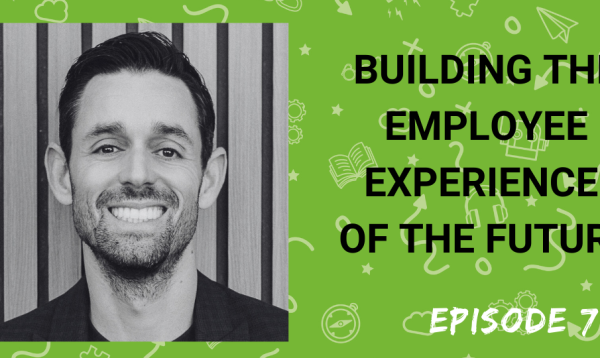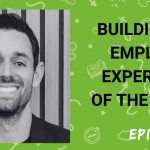In this episode Matt Alder talks to Ken Ward of Winter Court Consulting
There is a huge amount on content published on a weekly basis detailing tools and techniques that can help employers recruit software engineers and other digital professionals. It can be very difficult to separate what is sound advice from all the click bait and product spin.
My guest for this episode is Ken Ward from Winter Court Consulting. Ken has two decades worth of practical experience in tech recruitment and is keen to bust a number of popular tech recruitment myths and truisms.
In the interview we discuss:
• Key motivations that make tech professionals move jobs
• How to design a recruitment process that works
• The often-disputed role of LinkedIn, Email and Job Boards in tech recruitment
• The “Cult of The Engineer”
• Why most new recruiting products designed to help with tech recruitment are focusing on the wrong thing
Ken also gives a number of practical tips for all employers who are recruiting in this area
Subscribe to this podcast in iTunes
Transcript:
Matt Alder [00:00:00]:
Support for this podcast comes from Broadbean. Broadbean is a smart, innovative, global recruitment technology business. They help recruiters to reach candidates in a fast, effective and efficient way. From candidate attraction and job distribution to candidate sourcing and employee referral. Broadbean can help you post, search, track, socialize and engage. They’re also actively integrated with complementary tech businesses and job boards to make sure your recruitment process is 100% complete. Get the job done. With Broadbean.
Matt Alder [00:00:52]:
Hi everyone, this is Matt Alder. Welcome to episode 25 of the Recruiting Future podcast. There is a huge amount of content published on a weekly basis about tools and techniques that can help employers recruit software engineers and other digital professionals. It can be very difficult to separate the sound advice from the clickbait and the product spin. My guest this week is Ken Ward of Winter Court consulting. Ken has 21 years of experience in tech recruitment, the last 11 of which have been spent in house. In the interview, he busts a few popular tech recruitment myths and offers some practical tips for all employers recruiting in this area. Hi everyone and welcome to another Recruiting Future podcast interview. This week’s guest is Ken Ward. Hi Ken, how are you doing?
Ken Ward [00:01:46]:
I’m very well, sir. How are you?
Matt Alder [00:01:47]:
I’m very good, very good indeed. Enjoying the. Enjoying the summer? Definitely enjoying the summer. So tell everyone who you are, what you do and how you got to do it.
Ken Ward [00:01:58]:
Yeah, good question. So I’m Ken Ward, I’m co founder of a business called Winter Court Consulting. We provide in house recruitment teams to startups. So we work with startup founders both in terms of the actual hiring of hiring of staff, but also giving them some advice in terms of how to interview, how to write job specs, how to avoid some of the mistakes that are typically made in that scenario, but also some of the stuff that kind of goes into the more common sense areas of HR and that kind of stuff. So effectively it’s a recruitment team in a box if you like, but on a project basis, helping them grow on the maturity model until they’re ready for a kind of permanent in house recruitment team. Or indeed some of them will just be kind of dealing with hiring spikes. So they might need us back in kind of six months later when they’re hiring again. How did I get there? 21st year in recruitment. Oh my God. Should have got a proper job.
Matt Alder [00:02:52]:
Congratulations.
Ken Ward [00:02:54]:
It’s a big thing. We had a cake. No we didn’t. So we had. I guess like a lot of people. It wasn’t the case of Mummy I want to be a recruitment consultant. It was, there was a financial motivator there moved into recruitment agency which I did for in varying forms for 10 years before jumping over the fence into what the agency world called the dark side of in house recruitment where I’ve been for the last 11 years.
Matt Alder [00:03:17]:
That’s cool. And have you. I’ve kind of known you for a few years and you’ve kind of always focused on tech in that time. Have you always been a tech recruiter or is that something that you come into more recently?
Ken Ward [00:03:32]:
No, I started out as a tech recruiter in my first agency Tech probably over glorified it in the like most recruitment consultancy back in the days before the ARC didn’t know much about technology but we were salespeople so tech was out was our kind of was our product if you like from that perspective. But I’ve built engineering teams over the course of my career. I guess when I moved in house the focus became more generalist but hiring engineering teams was always part of our remit.
Matt Alder [00:04:02]:
And what are the sort of key challenges you see companies facing now in terms of hiring engineers? What’s the market like out there?
Ken Ward [00:04:14]:
I think part of it, I mean there’s almost dealing with a lot of self evident truths that are repeated out there that we’re challenging, a bit of myth busting that needs to be done almost to kind of what’s developed. And I guess a lot of this is inherited from our friends over in the west coast in Silicon Valley, almost the cult of the engineer. And we see that in some of the silver bullet recruitment products that are being offered to us to solve all our technical recruitment woes. I think a lot of it is based on the premise, which is actually a misquote around this whole concept of a war for talent and talent scarcity. And then various labor department forecasts be that with an or, or depending which side of the pond you are about the number of technical roles that are, that are kind of empty, et cetera. I think the reality on that is built up actually the fact that a lot of our companies we shouldn’t use our poor process as an excuse as really blaming a scarcity of talent on the fact that quite frankly we’re crap at recruiting a lot of the time. We just need to get back to back to basics essentially and understand that our tech candidate, potential tech employees are employees. They will have a lot of the same wants and Desires as any other employee. And I think that’s probably true of, in my opinion, the kind of the classification of millennials wanting different things often is kind of people want to be treated with respect. I think part of it is really, again, I think sometimes where you will have a brief from a hiring manager that I need, you know, I need 20 a player, as much as I hate that phrase engineers, you know, arriving on Monday. Well, frankly, Mr. Hiring Manager, you should have told us that three months ago. But hey, we have to deal with that as a recruitment team. But I think there’s a lot of myth around that as well. And also how to access that talent. There’s a lot of big myths, self evident truth that have been out there that engineers don’t respond to LinkedIn requests. They do. Also there was a really interesting blog published by Glenn Cathy talking based upon both the Stack Overflow report and Also there’s some LinkedIn data in there in terms of how candidates like to be contacted. And you know what, one of the things out there, they actually like to be contacted by email. So a lot of us are saying kind of we must move our whole recruiting initiatives to Facebook, we need to move all of our recruitment initiatives to Twitter and, you know, and various other products that are out there. But actually what we need to do is actually not make any assumptions about our candidate pool and just approach them, you know, where they are. And that will vary from skill set and I’m sure geography and everything in between.
Matt Alder [00:07:01]:
I think that’s really interesting because what I’ve noticed in the last couple of years is a lot of the recruitment products that have come onto the market that have got funding, particularly, particularly the stuff coming out of Silicon Valley, they always start with the premise that recruitment is broken. It’s always technical skill shortages that are used to kind of back that up. And they, you know, they’re all, they all, they all seem to have the answer to fix it. And I think as I said on a previous podcast, a lot of these sort of new products and technologies to help recruitment kind of look a little bit like the stuff that we’ve got already. They look like, you know, job boards and different versions of acss. I mean, what’s your experience of.
Ken Ward [00:07:45]:
Yeah, totally, that. I mean, a lot of worlds being offered. I mean, the plane is why I call the cult of the engineer often. I mean, there’s kind of one product that’s kind of moved over from the west coast that its whole premise is don’t apply to companies, let them apply to you for which they then charge you a 15% bounty when you’ve done all the work and hiring, etc. Etc. So I think there’s definite need for more transparency in the process. But actually I think a lot of it is playing to kind of the ideals. You know, recruitment is broken. It’s not, it obviously needs improving, it needs iterating and all those kind of good things and we need to get better at it. But I think more often than not you see hiring processes that are tortuous and drawn out and are in essence often, particularly in the technical space, pissing contests where one engineer is trying to prove how much more they know than another, whether it’s actually relevant to what they’re hiring at all. I don’t think it brings out the best of that. I think often as well we’re over hiring. You know, this, this whole kind of concept again came out of west coast of the 10 times engineer, which is based upon the premise that, you know, a great engineer is 10 times more productive than a poorer one. There’s an obvious, you know, there’s a, there’s, there’s an element of truth in that a good one is better than a poorer one. But often bearing in mind, you have to remember, you have to remember that a lot of the motivation for software engineers to join an organization, as much as you can read various blogs and videos from people like Joel Spolsky, the founder of Stack Exchange, where he paints a picture of an introverted software developer who wants to be left quietly, who doesn’t want to be contacted by phone or email. I think that’s a mirage. The software engineers that over my 21 years of recruitment are user facing. They have to be, they have to have great communication skills. So a lot of the things that they will want as an employee will be common across any employee being treated with respect, well remunerated, etc. But I think part of what really motivates them often is the working with great people, which I suppose the same could be true of any employee. But also they’re motivated by the scale of the technical challenge they’re actually undergoing. Now the reality is, be that in the startup world of the corporate, sometimes the scale of the corporate, the technical challenge is not that great now. So therefore the reality is why are we hiring this fabled 10 times engineer or this kind of, whether we call it the Purple Squirrel or the Unicorn or whatever, then actually that’s not what you need. One of my former CTO clients said actually, you know, sometimes we need foot soldiers as well, as officers, to use that analogy, you need people that are writing good, clean, scalable code often rather than kind of the fabled Google hiring process, et cetera. And I’ve had so many clients over the years that said to me, I want to hire the engineers that are rejecting Google and Facebook to come to us. And the question I asked them, why would they? Quite simply, I think there needs to be an element of realism in what you actually need. And I think this actually reflects back to this myth of the talent wolf, talent, et cetera. I think it’s kind of, there’s a lot of scope to start earlier with your engineering, be that through even as much as apprentice programs or graduate programs or something like that, and grow your engineers as well, rather than just looking for the quick fix of hiring the gunslinging big swinger engineer to come in and sort out all your problems. I think that’s part of the challenge itself.
Matt Alder [00:11:24]:
I think there’s some very interesting stuff there. And I think when you look at the online debates that are going on around tech recruitment, this kind of stuff doesn’t, doesn’t kind of get mentioned very often. You know, I think maybe part of that is because a lot of the content and a lot of the debate is being pushed by companies with products and services to sell. But why do you think it is that, you know, with so much talk going on online about recruitment, you know, some of, you know, some of some of these things that people on the ground are experiencing are kind of being lost in the, in the ether.
Ken Ward [00:12:05]:
Well, I think part of it is coming down to, I mean, if you think about, I mean, I was reading something on Adweek, there was a survey From I think 10, 2013, something like that, talking about the click through rates of negative headlines over positive, you know, if we accept this self evident truth that there is a war for talent, et cetera. So there’s a negative superlative underlying a lot of the writing. These are then offering a solution to that negative superlative. So you create the fear of this talent war and everyone’s looking therefore for the kind of, you know, the weapon of mass destruction to win that war. A war that in my view is kind of not really there. It’s more of a skirmish if anything. So I think that’s part of the problem. I think also there’s not really a word, but there’s also a kind of a blandification almost that goes on in recruitment, recruitment, blogging and online conversation. Where we actually recruit is much like engineers. We kind of do like the Shiny. So you see a lot of people getting excited about the concept of algorithm in their recruitment, machine learning, all those kind of good things and clearly that has a place. However, I don’t intend to get into a debate here as to whether you can replace a recruiter with an algorithm. You can definitely replace parts of that process perhaps, but anyone challenging that is often seen as either a Luddite, to use that English phrase, or holding back progress or often actually just called a troll just by questioning. I think, sometimes I think what we don’t do as recruiters enough, be it through fear of career advancement or the fact that you’re seen as a forward thinking recruiter, so you’re thinking of your, of your next career move by speaking through an algorithm. But actually just focusing on doing recruitment well is a big thing. So I think that we’re playing to that game a lot. But it does frustrate me a lot that actually a lot of the things, a lot of this talks, a lot of the products, as you said, or indeed people who might have a board advisory role with a particular product, we should question analytically in the same way that we would, I would hope, question a news article and look for potential bias or self interest in that and not be afraid to question, but question openly. I remember years ago I was at a roundtable where I think we were there actually Matt, where a new product was being demonstrated and then the organizer of the conference said, right, I want you to go around the table. Do you remember this?
Matt Alder [00:14:42]:
Yes, I remember it very well.
Ken Ward [00:14:44]:
Introduce yourself to the person who is a friend as well. So I won’t name him, he became a friend even though he forgave after this. But say, you know, give, introduce yourself and tell him exactly eye to eye what you think of his product. And we went around the table and everyone was saying, yes, it’s great and I’m X from Y. And it came to me and I thought it’s down to me again. And I said, I just don’t get your product, I don’t see the market fit, I don’t see the problem it’s solving. And I was trying to be constructive, not just being negative or falling into the rudder trolling category. But the really frustrating thing for me afterwards is talking to a lot of the people who had given kind of soothing palliatives to him in terms of his product, agreed with me, but they didn’t want. Why didn’t you tell him, you know, he was asking for feedback. Are you going to buy his product? No. Why not? Because I think it’s a piece of crap. Well, you could probably not tell him it’s a piece of crap, but you could maybe, maybe give him constructive criticism in terms of why you wouldn’t. And I think there is a slight reticence in terms of, I don’t know if it’s just an English thing or something that’s particular to the recruitment industry where we don’t want to stick our head above the parapet often.
Matt Alder [00:15:46]:
I think it’s something that being British, we could think was a British thing. But I’ve actually seen it all over the world actually when people are kind of launching those products. And I don’t think it’s particularly useful for the people launching the product either. I mean, again, without naming it, that particular product didn’t last very long and perhaps if they’d been given some more honest feedback at the start, then that might not have been the case. So kind of within everything you’ve been saying, there’s some sort of really interesting, you know, practical stuff. I just kind of like to sort of pull out, to kind of move us towards the finish really. So I, you know, I work with a number of, you know, what you call sort of traditional companies who are, you know, currently in a situation where their industries are going digital and they’re having to hire more and more, you know, people with digital skills or engineering skills or whatever it is into their organizations. And it’s kind of a bit of a rabbit in the headlights, I think, for a lot of organizations about how to do that. And I think a lot of that comes from some of the myths that you’ve been talking about. What advice would you give to a company like that in terms of their approach to, you know, building their own engineering team or getting digital strategy talent into their, into their, into their existing business.
Ken Ward [00:17:15]:
Well, apart from hire me, you mean?
Matt Alder [00:17:17]:
Well, obviously. Well, yeah, obviously apart from hire you.
Ken Ward [00:17:19]:
But no, I think part of it, there’s also a bit of a self evident truth in that technical candidates only want to talk to hiring managers, etc. In order to engage the interview process earlier on. And of course there is an element of truth in that, but only where the recruiter in that process has no credibility. So I think if you’re focusing on technical recruitment, a lot of us will be kind of the rabbit in the headlights thing, I think he said, in terms of this is not something I understand, but actually sit down with your engineers so you understand it. Don’t pick up the phone to an engineer unless you understand what you do I’m not talking about to the level of being able to code or whatever, being able to understand your technical stack and actually articulate that to your candidates. Articulate. Actually what I focus on whenever I talk to my technical century technical employees is I am not an engineer. I don’t pretend to be. And I think that’s the biggest mistake that we can make as recruiters because we’ll get found out very quickly for the most part. But actually what we can do is we understand what we do from a technical perspective and we understand what the behaviors are, you know, the core competencies, to use that more HR friendly phrase of what makes a good engineer in our organization. So we’re able to articulate that we should also work hard with our hiring managers to actually make them think about what they actually need to hire. And this is not just technical recruitment. This is every piece of recruitment someone leaves. I want to hire another one of those. Well, do you really? That person’s been here two years. So has the business not moved on two years in terms of the skills we’re looking to acquire? So make our hiring managers work a little bit harder, question them and then really work hard in terms of the process we put them through. Through. I’m not advocating, you know, just making that entirely frictionless as some of the, some of the much wanted recruitment products that we mentioned earlier or didn’t mention or hinted at, alluded to earlier, you know, create that silver bullet because we do need to technically assess our candidates. But let’s work hard in terms of actually is this, is this fit for purpose, this process which we should do as recruiters with everything we do. So let’s not make it unnecessary, let’s not make it excessively painful and then understand better recruitment basics. Right? In terms of actually talking to our candidates that we already have, in terms of understanding, well, where would they look for a job at the most basic, you know, basic level. The other thing I think is not for me is taking perhaps a more holistic approach to the recruitment channels that you look to follow now. You know, again, contrary to self evident recruitment truths and technical recruitment, candidates do respond to LinkedIn requests. If your LinkedIn request is bearing in the credibility that I mentioned earlier, informed and articulate and is appropriate from that perspective. Candidates do respond to job board advertising. I know that’s probably contrary to most of what the industry is saying at the moment, but they really do. So you can still fill jobs through that. So if you have budget, don’t be afraid to try stuff. The other thing Is I think is work out what’s fit for purpose for your organization. So there aren’t any silver bullets. That’s the reality. So if someone says to you all your technical recruitment should be done through Twitter, question that, try it. If it doesn’t work because Twitter is a long play as opposed to a kind of a broadcasting channel in my opinion, then you have to invest more time in it. So there’s an ROI from a time perspective. If you have a wider budget, you have a little job board budget, you have time to work through LinkedIn and the other Stack Exchange and Stack Overflow and GitHub etc. The other repositories, then you should try all of those different channels. So you need to take a more 360 approach.
Matt Alder [00:21:13]:
Very wise words there. Final, final question. So what, what trends have you actually got your eye on? We’ve talked a lot about, you know, myths and cults and, and all these kind of things. But you know, in terms of how the industry is developing, you know, whether that’s in terms of technology, in terms of approach, whatever that might be, you know, what are your sort of tips for the future? What are you looking at with interest at the moment?
Ken Ward [00:21:43]:
You’re the futurologist, Matt. But no, I think, look again, a lot of it is kind of recruitment buzz phrases. It’s the shiny, the algorithm, machine learning, et cetera. I do believe there are parts of our process that we can do better and therefore that can be automated. So I’m looking at that with interest and how that still retains the human touch, which I think is essential in the recruitment process. Ultimately, I think one of the false premises that algorithms, and this may I suppose in some part be covered by my ignorance in that perspective that an algorithm will remove any bias, but to which I then counter or who programs the algorithm in the first place.
Matt Alder [00:22:24]:
Yeah, exactly.
Ken Ward [00:22:25]:
So there is that element to it, not to say that won’t evolve. I think one of the real, I don’t think what anyone’s cracked right yet is technical assessment. There’s been various companies, startups, et cetera, that come out wanting how they’re going to solve this and how they’re going to get the best technical candidates. And I don’t think they’ve done that yet. So I’m always interested in products that will kind of add some value and therefore speed up the process so that I as a recruiter, when I present my CV to my internal hiring manager, ultimately I can say, yeah, they conform to all of the things that we look for in what makes a great engineer from a behavioral perspective. But ultimately, if they can’t code, then there’s no point carrying on in the process. So if I’m at the front end of that process, as I think I should be as a recruiter, then I need something at that point that also gives me some kind of technical assessment of the candidate. So the hiring manager will say, yep, I know Ken gets what makes a great engineer. But also there’s some kind of empirical evidence to back that up as well. So that’s a big thing for me. Me.
Matt Alder [00:23:30]:
Ken, thank you very much for talking to me.
Ken Ward [00:23:32]:
Absolute pleasure as always.
Matt Alder [00:23:35]:
My thanks to Ken Ward. For show notes and past episodes of the podcast, please go to www.rfpodcast.com. you can also subscribe to the mailing list there and find out more about me on the Work with Matt Alder page. You can, of course, subscribe to the podcast itself on itunes and on Stitcher. Thanks very much for listening. I’ll be back next week and I hope you’ll join me.








